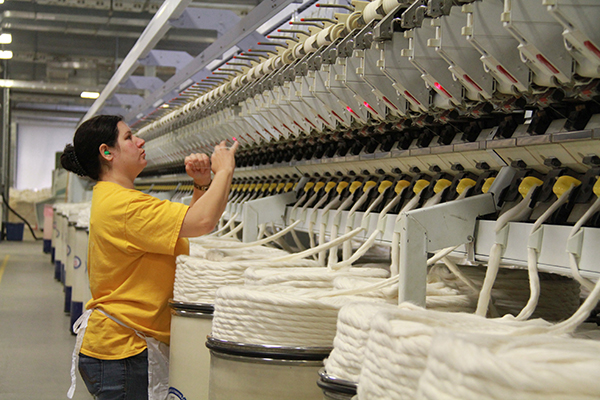US policy becomes difficult to predict following poll
Updated: 2016-11-10 08:24
By Li Xiang(China Daily)
|
|||||||||
 |
|
A worker at a textile mill invested and constructed by Keer Group from China in South Carolina in the United States. [Photo/Xinhua] |
Analysts say it's important for companies to watch who Trump taps for cabinet posts
Donald Trump's surprise victory will probably bring with it more uncertainties to US economic policy, which analysts said underlined the importance of portfolio diversification for investors and Chinese companies.
Analysts said Trump's lack of governing experience and his inconsistent policy pronouncements during the election campaign could make it difficult to predict future US trade and investment policies.
They added that it would be important for companies and investors to monitor who Trump will appoint to key offices in Washington.
"Given Trump's limited background in politics, markets will look toward his appointments for top administrative posts for clues about his policy agenda. The result underlines again the importance of investment diversification, both in terms of regions and asset classes," said Mark Haefele, global chief investment officer of wealth management at UBS AG.
In his victory speech, Trump said the US would "deal fairly with everyone" and he would seek "common ground, not hostility, and partnership, not conflict".
China has been a prominent investor in the US as Chinese companies have made a slew of multibillion acquisitions of US businesses, including General Electric Co's appliance business, Strategic Hotels & Resorts, technology company Ingram Micro as well as film studio Legendary Entertainment.
According to data from research firm the Rhodium Group, Chinese companies invested a total of $18 billion in the first half of 2016. More investments could be expected if Beijing and Washington reached final agreement over the ongoing negotiation for the Bilateral Investment Treaty, analysts said.
They added that the initial impact of the Trump victory on the current growing trend of Chinese direct investment in the US would not be substantial. But they warned about potential rise of protectionism in the US economic policy, which could negatively affect bilateral trade and investment.
"It can be expected that US trade and investment policy would likely tilt more toward de-globalization and protectionism, which is becoming increasingly popular internationally," said Wu Qing, a financial researcher at the State Council's Development Research Center.
Raymond Yeung, chief China economist at ANZ Group, said the immediate impact of a changing presidency in the US on China would not be as large as perceived.
Related Stories
US vote not expected to affect yuan in big way 2016-11-09 06:51
Don't worry when US market goes crazy 2016-11-08 09:08
Analysts say softer yuan not a sure thing 2016-11-02 08:20
China stocks end lower on Wednesday 2016-11-09 15:38
Trump, Clinton products flood the market ahead of presidential race 2016-10-26 14:05
Today's Top News
Polls missed support for Trump
Superstars party with Jack Ma before shopping spree
Europe would elect Clinton: Poll
UK 'will stick to planned EU departure plan'
UK PM May promises EU exit 'in full'
Chinese dance drama stuns British audience
China adopts interpretation to Basic Law of HK SAR
Latvia links with Belt and Road Initiative
Hot Topics
Lunar probe , China growth forecasts, Emission rules get tougher, China seen through 'colored lens', International board,
Editor's Picks

|

|

|

|

|

|







